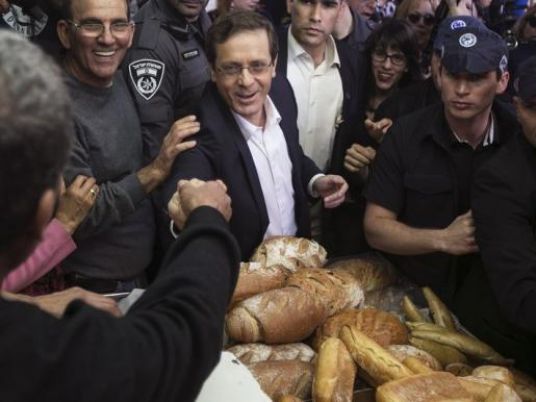
Israel's centre-left opposition is poised for an upset victory in national elections next week, with the last opinion polls before the March 17 vote giving it a solid lead over Prime Minister Benjamin Netanyahu's party.
Polls in two of Israel's leading newspapers predicted the Zionist Union would secure 25 or 26 seats in the 120-seat Knesset, against 21 or 22 for Likud. All polls in the past three days have given the same margin of victory.
No party has ever won an outright majority in Israel's 67-year history, making coalition-building critical to the formation of a government.
Because there are more parties on the right and far-right of the political spectrum, Netanyahu was expected to be able to cobble together a coalition more easily than the centre-left, even if he narrowly loses the vote.
But there was positive news for the Zionist Union on that score too, with a poll of Israeli-Arabs showing the overwhelming majority would favour their united Arab party joining a centre-left coalition government.
The survey showed 71 percent thought the Joint Arab List, which groups four Arab parties and enhances their electoral clout, should sign up with the Zionist Union, while 16 percent said it should support the coalition from the outside.
With the Joint Arab List expected to win 13 to 15 seats, it has become an important player in the election – it could end up being the third largest group in parliament, giving a powerful voice to Israel's 20 percent Arab minority.
If the Zionist Union, jointly led by Labour party leader Isaac Herzog and former justice minister Tzipi Livni, wins, it is expected to link up with the far-left Meretz party (5 or 6 seats) and the centrist, secular Yesh Atid (13 seats).
With the Arab list on side too, it would need the support of just one more party with around 5 or 6 seats to cross the threshold of 61 and form a coalition.
That said, while the arithmetic is possible, it is still challenging. Israel's coalition-building is a messy and convoluted game that can spring surprises at the last minute.
POST-ELECTION BATTLE
When he called this election in December, Netanyahu looked to be in a commanding position and set for a fourth term. But the past three months have exposed vulnerabilities in his armour after nine years in power spread over three terms.
His campaign focus on security issues and on the threat from Iran's nuclear programme has failed to inspire voters, who consistently say that economic issues, including soaring house prices and the high cost-of-living, are their chief concerns.
Netanyahu's much-criticised speech to the U.S. Congress on March 3 also appears to have marked a turning point. Rather than giving him an electoral boost, with his face on primetime TV, polls turned against him shortly after the event.
He has also relentlessly attacked Herzog, a man of small stature with a reedy, slightly high-pitched voice. But Herzog has countered with a quick sense of humour and sharp intellect.
With the conflict with the Palestinians barely mentioned, there are signs that voters are growing fed up with Netanyahu's hard-charging style of leadership. One poll published on Friday showed 72 percent of Israelis say a change is needed.
In the past two days, Netanyahu has talked more about economic issues and his ideas for bringing housing prices down, but it may be too little, too late. Earlier this week he said there was a "real danger" he could lose and he took a similar line in an interview on Friday, urging his supporters to vote.
"Don't stay at home and don't waste your votes," he said on local radio, sounding like he was suffering from a cold.
"I will not be elected if the gap is not closed and there is a real danger that Tzipi and Bougie will form the next government," he said, referring to Herzog by his nickname.
